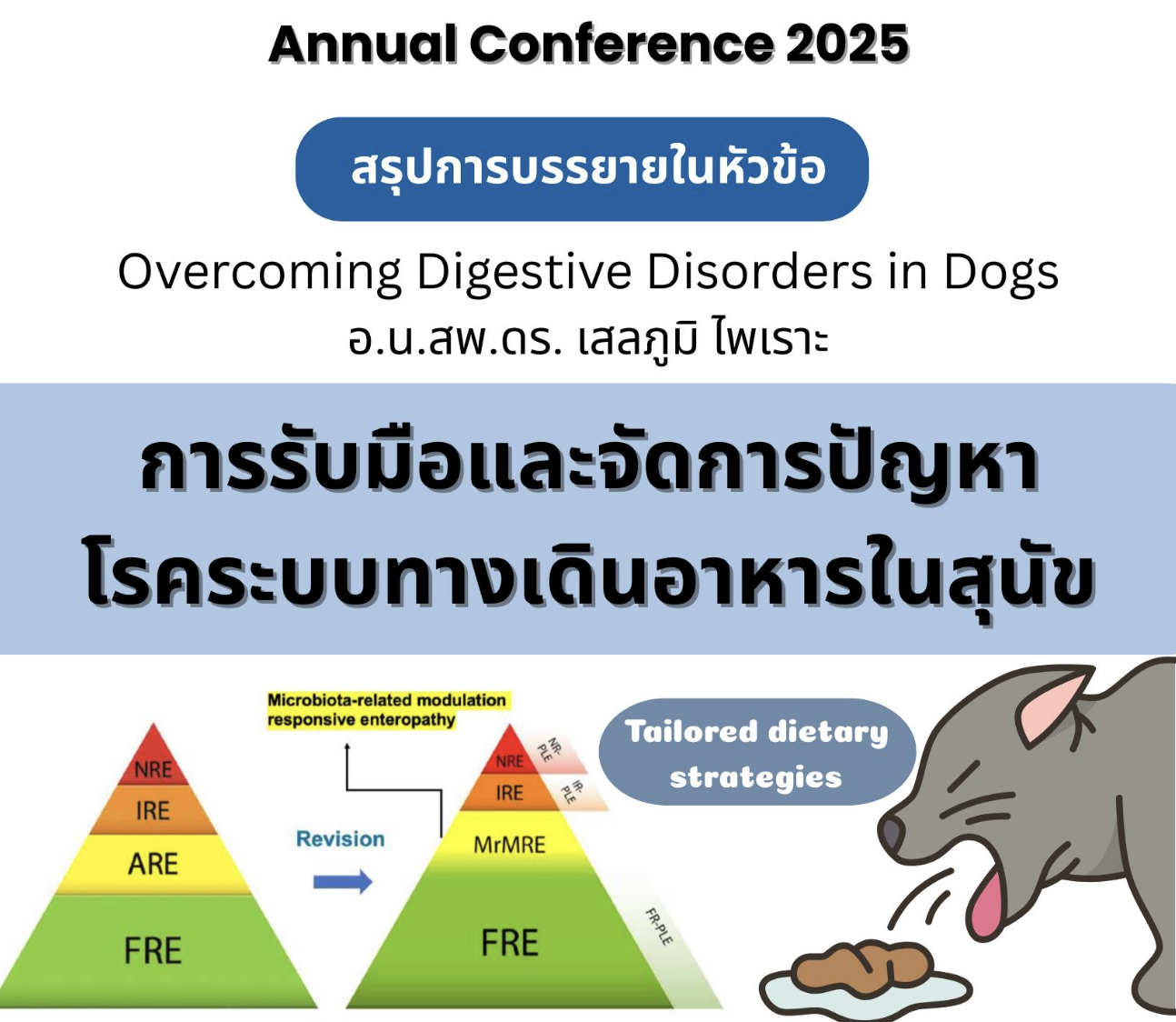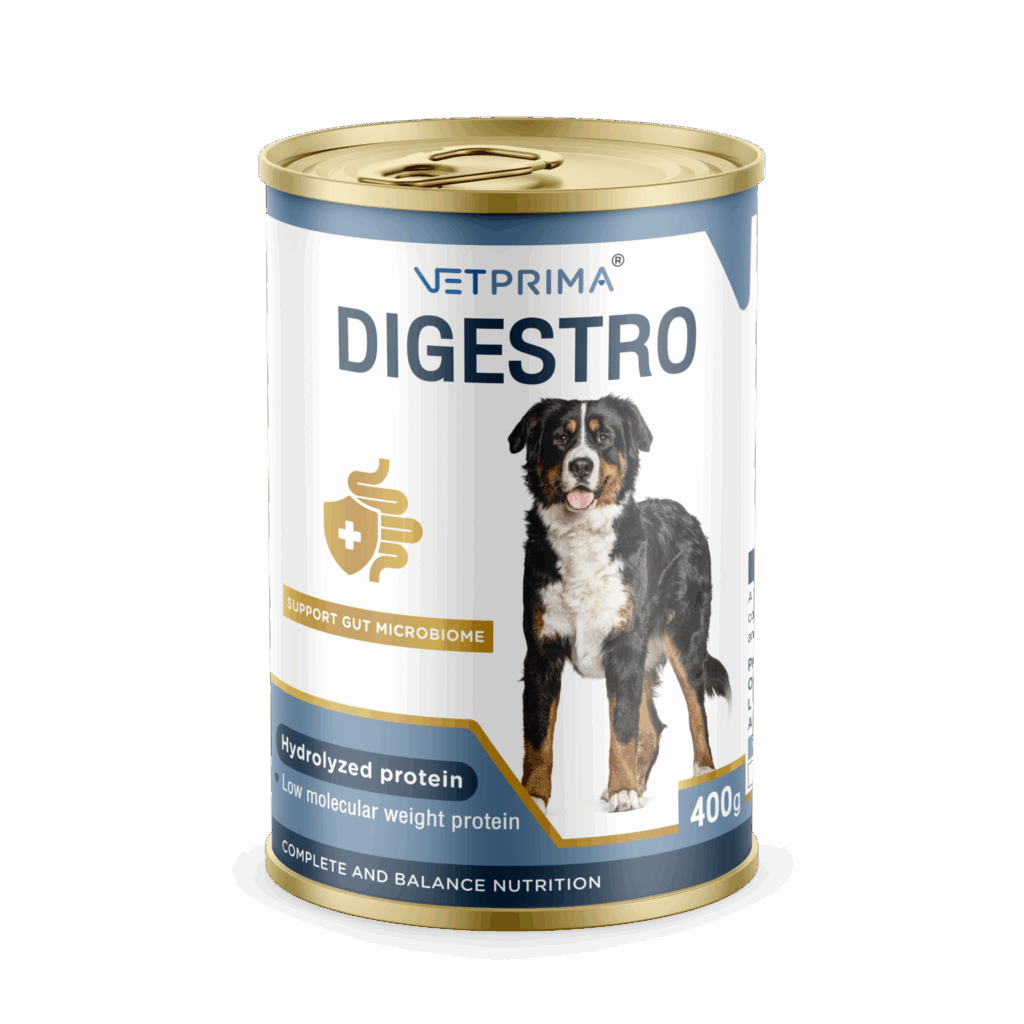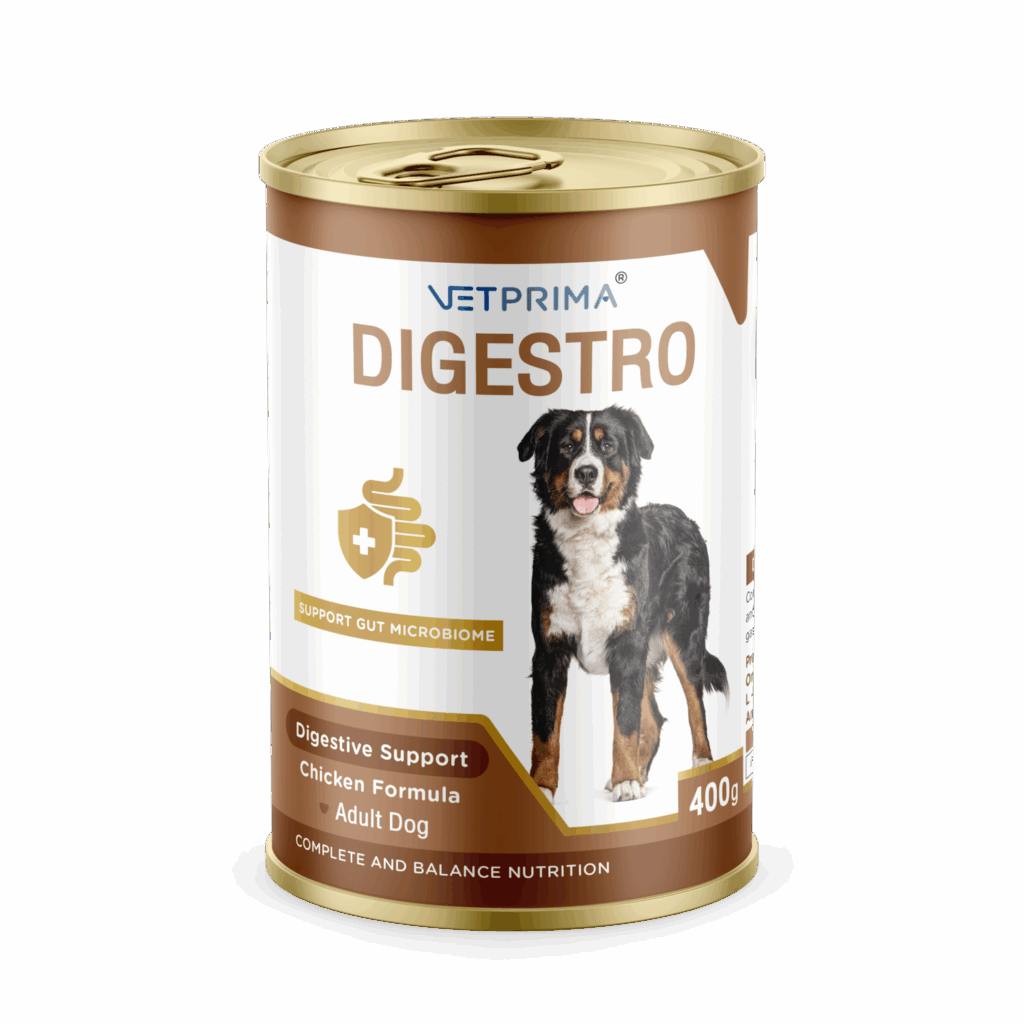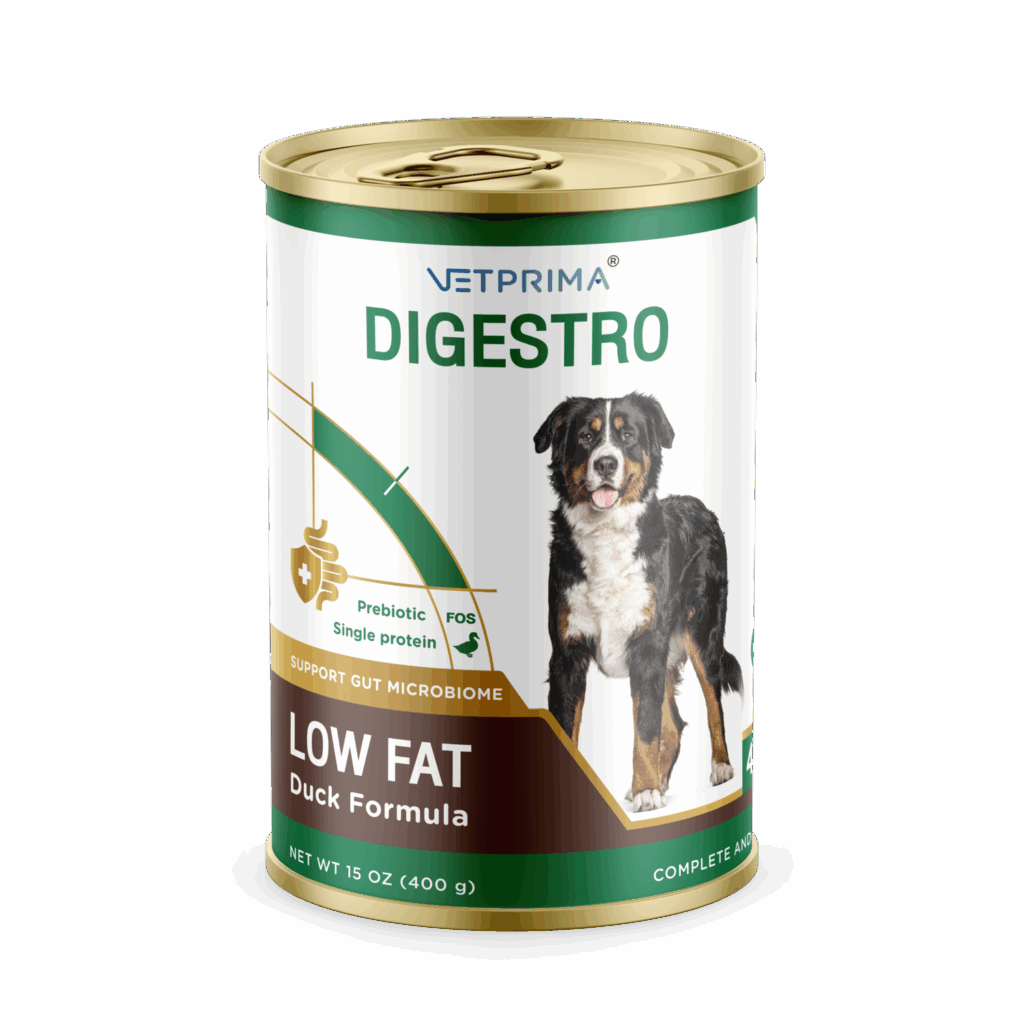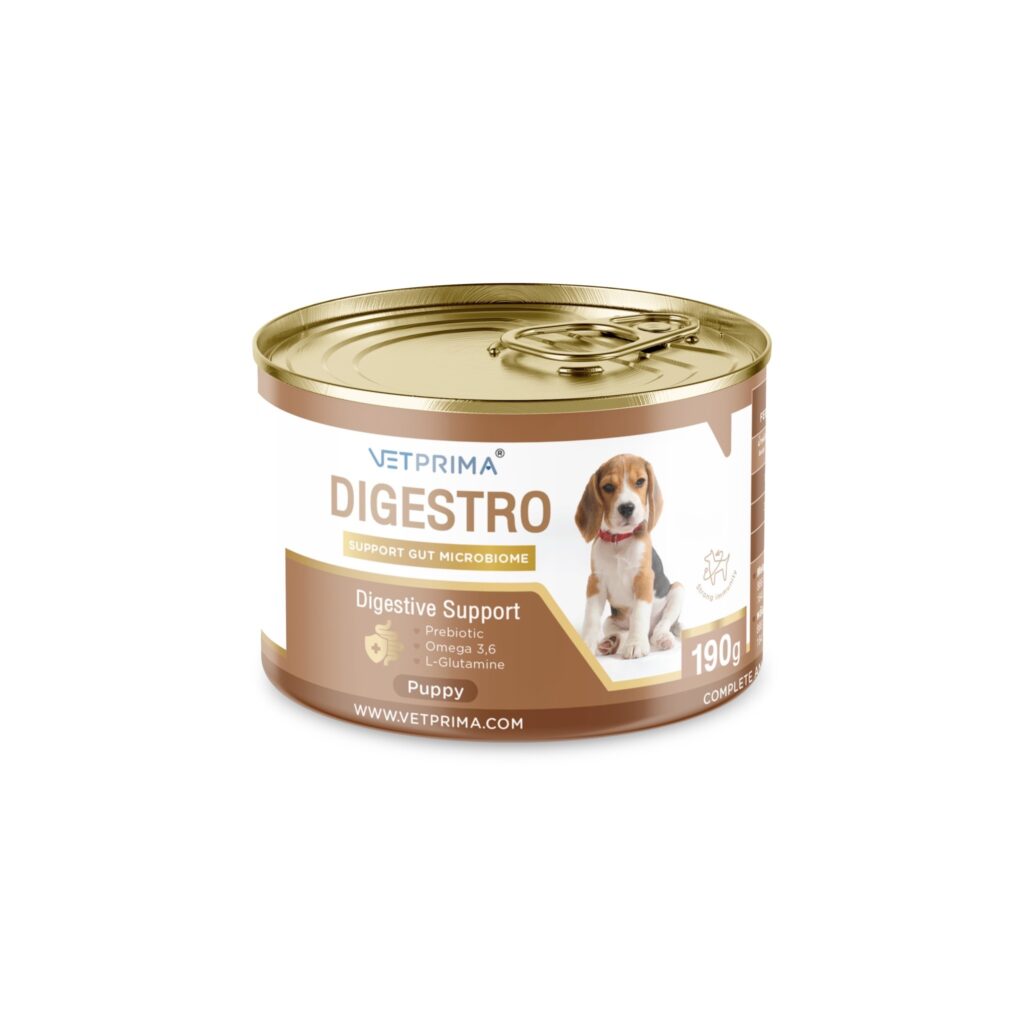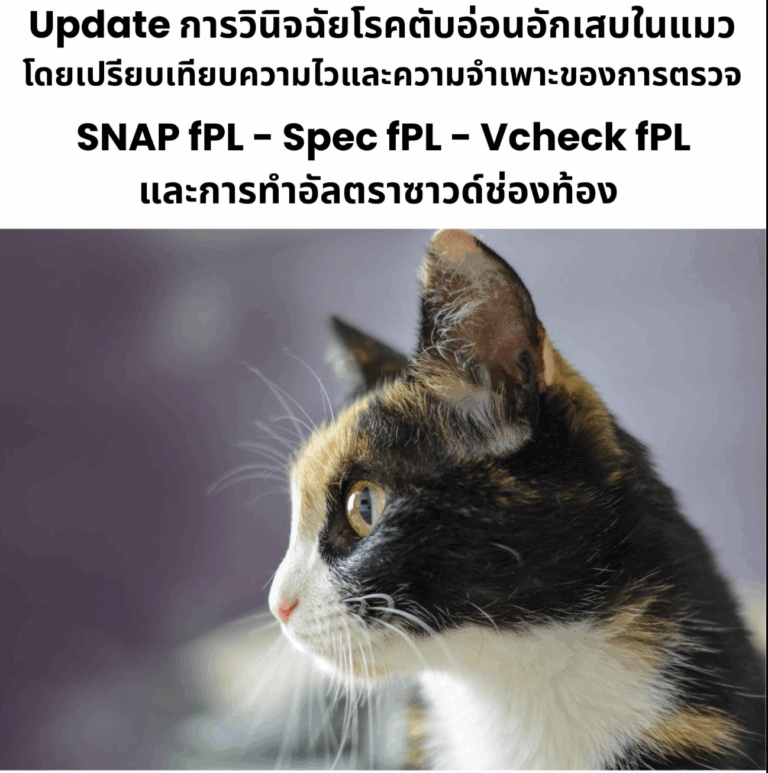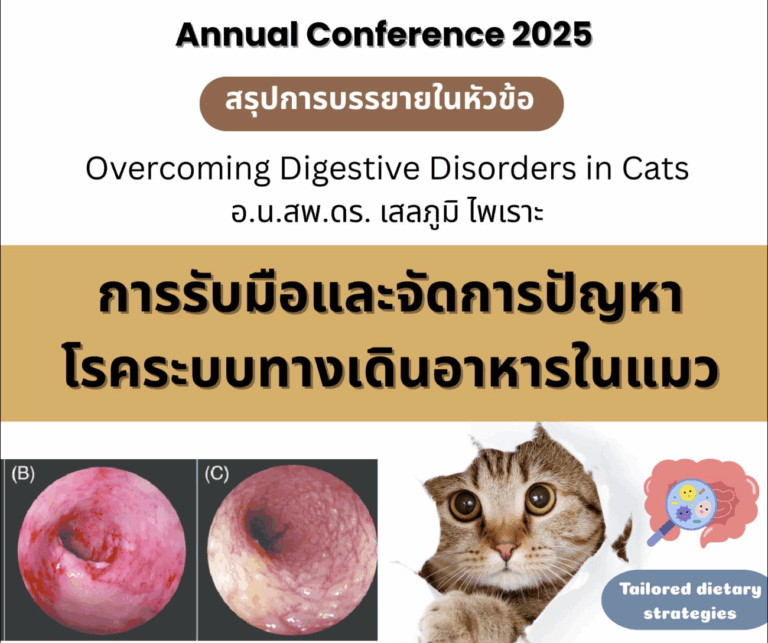บรรยายโดย: อ.น.สพ.ดร.เสลภูมิ ไพเราะ
Trending Topics:
- Common GI Disease in Dogs & Cats
- Comprehensive treatment strategies for gastric disorder
- Acute diarrhea & Chronic diarrhea
- Dietary manipulation in patients with CIE
- Tailored dietary strategies for patient with intestinal disorders
- Novel trend in Prebiotic and Probiotic
- Management of EPI
Overcoming Digestive Disorders in Dogs
GI disorders: เกิดจาก structural abnormality พบได้เมื่อทำ ultrasound และ biopsy หรือเกิดจาก functional abnormality ที่อาจไม่พบปัญหาจากการทำ ultrasound และ biopsy
Pathological conditions ที่เกี่ยวข้องสามารถแบ่งออกได้เป็น 2 ประเภทหลัก:
- Primary GI disorders: มักเกิดจาก structural abnormality เช่น ผนังลำไส้เล็กผิดปกติ ส่งผลต่อการดูดซึมอาหาร
- Extra-GI causes: เกิดจากปัญหาในตับ ถุงน้ำดี ตับอ่อน ระดับ electrolyte และระบบ endocrine
ตัวอย่างของ Extra-GI functional abnormality:
- Hypokalemia: การบีบตัวของทางเดินอาหารลดลง
- Hyperthyroidism: การบีบตัวของทางเดินอาหารเพิ่มขึ้น
- Hypoadrenocorticism: ส่งผลต่อสมดุลทางเดินอาหาร
Primary GI disorders & Extra-GI causes สามารถเกิดร่วมกันได้ เช่น รอยโรคในกระเพาะอาหารทำให้กินไม่ได้และอาเจียนจนเกิด hypokalemia และลด motility
อาการของ GI disorder ในสุนัข: อาเจียน ท้องเสีย น้ำหนักลด เบื่ออาหาร เลือดปนอุจจาระ ปวดท้อง
Therapeutic Approaches to GI Disorders
- Specific treatment: การรักษาเฉพาะโรคที่วินิจฉัยได้แล้ว
- Non-specific treatment: การรักษาตามอาการที่พบ เช่น fluid therapy, antiemetics, prokinetics, analgesics, GI protectants, anti-foaming agents
- Additional treatment: เช่น appetite stimulants, probiotics, prebiotics, B12 supplement, management of PLE
- Dietary management: มีบทบาทในการรักษาโรค ให้สารอาหารเพียงพอ ป้องกันและรักษาโรค
Gastritis
- การอักเสบของกระเพาะอาหาร เกิดจากสารเคมี เนื้องอก การติดเชื้อ อาจมี ulceration/erosion
- อาการ: Vomiting, decreased appetite, abdominal pain
Chronic gastritis ( >2 สัปดาห์): เกิดจาก allergy หรือ idiopathic
แบ่งตาม cellular infiltrate:
- Lymphoplasmacytic gastritis (LP): บ่งชี้การกระตุ้นทางภูมิคุ้มกัน สาเหตุ: food allergy, long-term bacterial infection
- Eosinophilic gastritis: สาเหตุ: food allergy, parasitic disease, idiopathic, อาจพบ eosinophilia
แบ่งตาม morphologic changes: hypertrophic gastropathy, atrophy, mineralization, ulceration, edema, fibrosis
แบ่งตาม severity: mild, moderate, severe
Gastric erosion และ ulceration
- ชั้น mucus หายไป แผลลึกถึง muscularis
- สาเหตุ: NSAIDs, neoplasms, hepatic dysfunction
การรักษา
- Specific treatment ตาม underlying etiology
- Non-specific treatment: antiemetics, prokinetics, GI protectants, anti-foaming agent, fluid therapy, analgesics
Consensus opinion
- Omeprazole 1 mg/kg BID
- Misoprostol ลด gastric lesion ในกรณีใช้ aspirin (ระวังในสัตว์ตั้งครรภ์)
- Sucralfate ควรให้เป็น liquid suspension
- ไม่แนะนำให้ใช้ยาลดกรดแบบ prophylaxis
ข้อบ่งใช้ในการใช้ PPIs
- มีการวางยาสัตว์ที่เสี่ยง gastric reflux
- อาเจียนเรื้อรัง กังวลเรื่อง esophageal irritation
Dietary Management สำหรับ Gastric Disorders
- ไม่ควรให้ fat และ fiber สูง เพราะลด gastric motility
- อาหารที่มีความชื้นสูงจะลดการระคายเคืองได้
Helicobacter-associated Gastritis
Indications:
- เมื่อ chronic gastritis แล้วหาสาเหตุอื่นไม่ได้ เมื่อทำ biopsy พบ histologic evidence ของ gastric inflammation และเคยให้ยาลดกรด, steroid มาก่อนหน้าแล้วยังไม่ดีขึ้น
การรักษา —> Triple Therapy
- Amoxicillin 20 mg/kg PO q8-12h
- Metronidazole 20 mg/kg PO q8-12h
- Omeprazole 1 mg/kg PO q12-24h
Delayed Gastric Emptying
- Mechanical causes: Neoplasms, polyps, pyloric stenosis, foreign body
- Functional causes:
- Primary: GDV, dysautonomia
- Secondary: opioids, anticholinergics, metabolic disease, post-op ileus
การรักษา:
- ตาม underlying cause
- ลด opioids
- ใช้ prokinetics ในกรณี functional disorders
- ให้กินน้อยแต่บ่อยครั้ง
Acute Diarrhea
การประเมิน severity:
- Mental status: BAR, mild/moderate/severe depressed
- Systemic response: hypovolemia, fever
การมีเลือดในอุจจาระไม่ใช่ตัววัด severity แต่บ่งบอกว่าอาจมี mucosal injury
การรักษา:
- Moderate-severe: ให้ IV fluids
- ถ้ามี fever และคาดว่า sepsis ให้ antimicrobials
- First line: ampicillin, amoxicillin-clavulanate, TMP-SMX
Chronic Diarrhea ( > 3 สัปดาห์)
แบ่งเป็น:
- Small bowel disease: primary GI, EPI, endocrine disorders
- Large bowel disease: primary GI
Chronic Inflammatory Enteropathy
การจำแนกตามการตอบสนองต่อการรักษา:
- Food-responsive enteropathy: ดีขึ้นเมื่อเปลี่ยนอาหาร
- Microbiota-related modulation responsive enteropathy: ใช้ probiotic/prebiotic
- Immunosuppressant-responsive enteropathy: ใช้ glucocorticoids หรือยา immunosuppressive
- Non-responsive enteropathy: ไม่ตอบสนองต่อ 3 ขั้นตอนแรก
วัด severity ด้วย canine IBD activity index
Dietary Manipulation ใน CIE
- Highly digestible, low residue diet: ย่อยง่าย ลด osmotic diarrhea
- Low fat diet: สำหรับ fat maldigestion (EPI, IL)
- Fiber-enriched diet: เพิ่ม motility
- Novel/hydrolyzed protein: ลด food allergy
Tailored Dietary Strategies
- Acute small intestinal disorders: highly digestible, low residue, แบ่งมื้อให้กินบ่อย
- Chronic small intestinal disorders: highly digestible, novel/hydrolyzed protein
- IL: low fat, high protein, highly digestible
- Short bowel syndrome: กินน้อยแต่บ่อย
- Large intestinal diarrhea: เพิ่ม fiber, อาจใช้ novel/hydrolyzed protein
- Dysbiosis: fiber diet, low-residue diet, probiotic diet ขึ้นกับสาเหตุ
- Constipation/obstipation/megacolon: high-fiber หรือ low-residue หาก obstruction
Dysbiosis of Gut Microbiota
- ส่งผลแบบ local/systemic เนื่องจาก SCFAs, amino acids ดูดซึมไปยังอวัยวะอื่น
- สาเหตุ: อาหารย่อยไม่ได้, ใช้ยาลดกรด ฯลฯ
การจัดการ
- Probiotics / Prebiotics / Synbiotics
- Diet modifications
Probiotics:
- Live microorganisms ควรไม่ให้พร้อม antibiotics
- LAB: Lactobacillus, Bifidobacterium, E. faecium, S. thermophiles, P. acidilactici
- Non-bacterial: Saccharomyces spp.
งานวิจัย:
- Acute gastroenteritis: stool normal เร็วขึ้น
- Parvovirus: ให้เมื่อ enteritis หาย, WBC เพิ่ม
- Metronidazole vs probiotics: probiotics ดีกว่า
- ยังไม่มีข้อมูลว่าควรใช้จุลชีพใด และใช้ระยะเวลาเท่าไร
Prebiotics:
- อาหารของ probiotic เช่น dietary fiber
Exocrine Pancreatic Insufficiency (EPI)
- ไม่มีการสร้าง digestive enzymes
การจัดการ:
- Pancreatic enzyme replacement
- Dietary modification: เริ่มด้วย highly digestible, low-residue diet
- เมื่อควบคุมอาการได้ สามารถใช้อาหารทั่วไป + enzyme
- Cobalamin supplementation
- Monitor: body weight, plasma protein, fecal score
เรียบเรียงโดย
สพ.ญ. ปริยากร โชคณาโรจน์วงศ์
คำแนะนำจากทีมสัตวแพทย์ Vetprima
โรคทางเดินอาหารในสุนัข เช่น อาการท้องเสียเรื้อรัง ลำไส้อักเสบ หรือภาวะขาดเอนไซม์ย่อยอาหาร (EPI) ล้วนเป็นความผิดปกติที่ต้องอาศัยการวินิจฉัยอย่างถูกต้อง ร่วมกับการวางแผนโภชนบำบัดที่เหมาะสมกับแต่ละสภาวะของสุนัข
ในกรณีของ สุนัขที่มีอาการท้องเสีย ถ่ายเหลว หรือถ่ายมีเลือดปน เราขอแนะนำให้เจ้าของสัตว์เลี้ยงปรึกษาสัตวแพทย์ทันที เพื่อแยกแยะสาเหตุอย่างแม่นยำว่าเกิดจากภาวะระบบทางเดินอาหารโดยตรง หรือมีปัจจัยจากโรคภายนอกระบบ เช่น ต่อมไร้ท่อ หรือความผิดปกติของตับอ่อน
ทีมสัตวแพทย์ Vetprima แนะนำว่าการเลือก อาหารสุนัขท้องเสีย ควรเน้นสูตรที่ ย่อยง่าย ไขมันต่ำ และมีการเสริม ไฟเบอร์ หรือโพรไบโอติก เพื่อช่วยฟื้นฟูสมดุลของระบบลำไส้ โดยเฉพาะในกรณีของ chronic enteropathy หรือภาวะ dysbiosis
หากสุนัขของคุณมีปัญหา ถ่ายเหลวเรื้อรัง หรือได้รับการวินิจฉัยว่าเป็นโรคทางเดินอาหาร ควรมีการติดตามอาการอย่างต่อเนื่อง และปรับสูตรอาหารให้เหมาะกับภาวะโรค เพื่อให้การรักษาได้ผลดีและฟื้นฟูคุณภาพชีวิตของสัตว์เลี้ยงได้อย่างยั่งยืน
